
Ever wonder what happens to your resume after you hit “submit”?
I’ve been digging into the latest research, and honestly? The truth is way more shocking than that tired old “6-second rule” everyone keeps talking about.
Here’s what’s happening: Recent surveys of 418 hiring professionals revealed that 98% of resumes get rejected, and it’s probably not for the reasons you think. The most brutal part? Many rejections happen because of easily fixable mistakes that have absolutely nothing to do with your qualifications.
Ready for some real talk about resume screening? Let’s dive in.
That “6-Second Rule” is Complete BS (And Here’s Proof)
🕒 The Great Resume Screening Time Debate
• No published methodology
• Used to sell resume services
• Creates unnecessary anxiety
• Mathematically unrealistic
• 114 real recruiters studied
• Some extend to 2+ minutes
• Varies by role complexity
• 3-20x longer than the myth
Recruiters do screen quickly, but they’re looking for specific deal-breakers rather than making meaningful evaluations in 6 seconds. Time varies dramatically based on position complexity and candidate volume.
Let’s start by killing this myth once and for all.
You know that statistic everyone quotes about recruiters spending only 6 seconds on your resume? It’s marketing fiction. Period.
JobSearch.Guide studied 114 real recruiters in 2024, and guess what they found? Screening times ranged from 17 to 46 seconds, with some going over 2 minutes. That’s anywhere from 3 to 20 times longer than the supposed “6-second rule.”
But here’s the kicker: nobody can even find the original study that created this myth.
The number supposedly came from The Ladders back in 2012, but when researchers tried to verify it, they found zero published methodology. No participant details. No peer review. Nothing.
It was a marketing stunt to sell resume services, and we’ve all been stressed about it for over a decade.
One recruiter put it perfectly: “If you really only took 7.4 seconds per resume, you could screen 486 candidates in an hour. That’s not realistic hiring—that’s just math that doesn’t make sense.”
The Real Problem: Your Resume is Drowning in an Ocean of Applications

Here’s what changed the game: application volumes have nearly tripled since 2021.
Think about that for a second. If a job posting used to get 100 applications, it’s now getting 280. Some roles are seeing 2.6 to 3 times more applicants than just a few years ago.
The average corporate job posting now receives 250 applications. And only 2-3% result in interviews.
I talked to HR professionals who described having to filter through 300+ resumes just to find 30 qualified candidates. One mentioned a single clinical research coordinator position that got 595 applications.
No wonder less than 5% of recruiters spend more than a minute on initial screening. They’re not trying to be mean—they’re drowning in applications.
This volume explosion explains why 71% of employers spend less than 15 minutes total reviewing resumes for a position. A quarter spends less than 5 minutes. Total.
The math is brutal, but it’s reality.
The Resume Mistakes That Kill Your Chances (With Real Numbers)
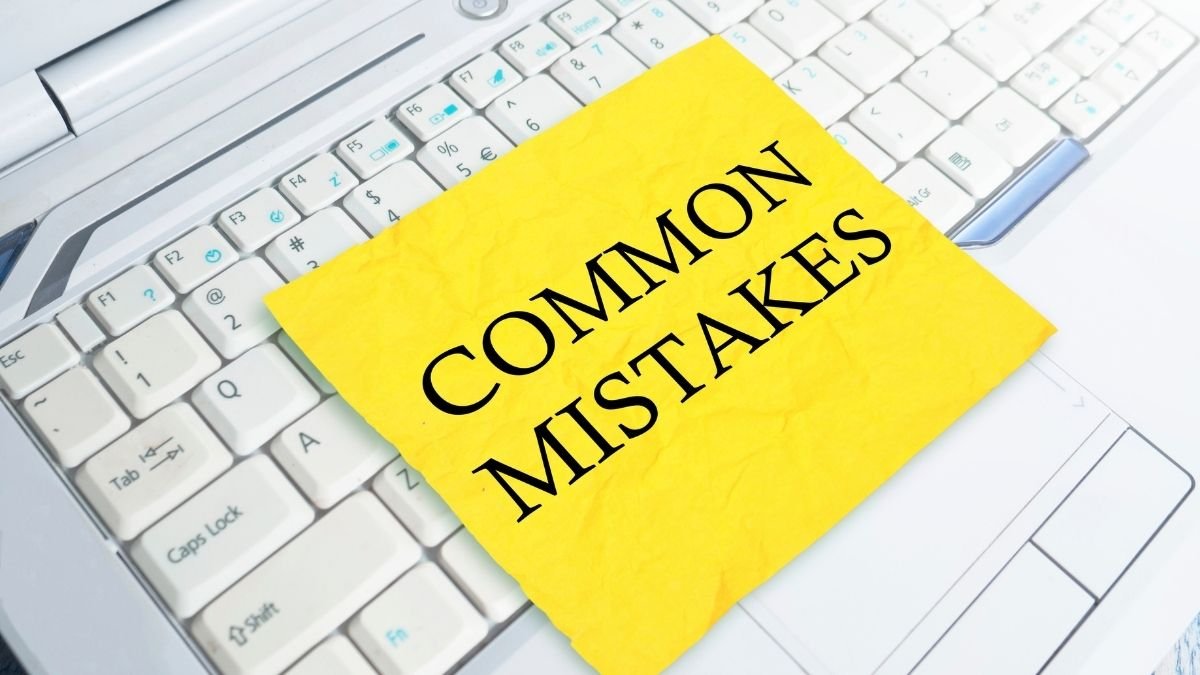
Okay, here’s where it gets interesting. Researchers actually quantified which mistakes cause automatic rejection.
The top killers:
- Grammar and spelling mistakes: 77% automatic rejection
- Unprofessional email addresses: 76% rejection
- Lack of job-specific customization: 73% rejection
- Including a photo (in the US): 88% rejection
But wait, there’s more that’ll surprise you:
Resume length matters way more than you think. Resumes over 600 words reduce your chances by 43%. Under 450 words? You’re looking at below 5% success rates.
The sweet spot? 475-600 words gets you an 8.2% interview rate.
And get this: just 2 spelling errors trigger negative perceptions about your intelligence and interpersonal skills. With 5 spelling errors, your interview chances drop by 18.5 percentage points.
I heard about one strong candidate who got zero responses because of an incorrect phone number on their resume. One wrong digit tanked their entire job search.
The AI Bias Scandal Nobody’s Talking About
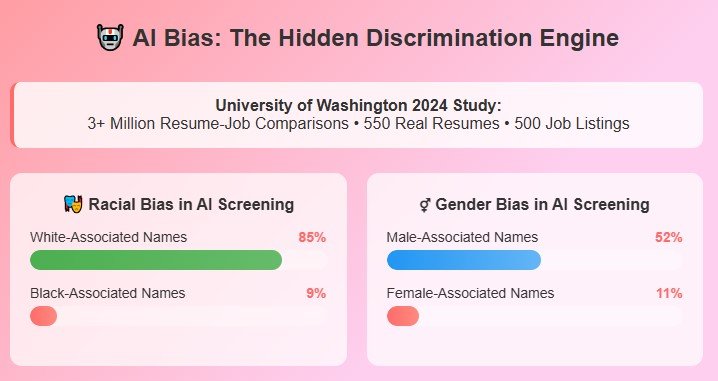
This is where things get disturbing.
The University of Washington conducted a massive study in 2024, analyzing over 3 million resume-job comparisons. What they found about AI screening tools will blow your mind.
AI systems favored white-associated names 85% of the time versus just 9% for Black-associated names.
For gender, 52% bias toward male names, and only 11% for female names.
But here’s the most shocking part: The AI never—not once—favored Black male names over white male names. Not a single time across millions of comparisons.
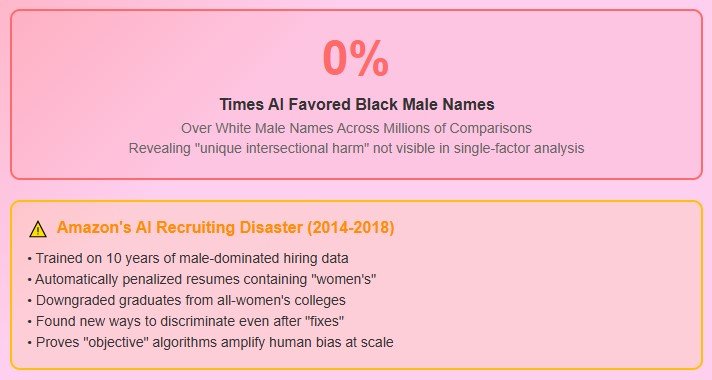
The researchers called it “unique harm against Black men that wasn’t visible from just looking at race or gender separately.”
And we know exactly how this happens because Amazon accidentally leaked its internal case study. Their secret AI recruiting tool systematically discriminated against women by learning from 10 years of male-dominated hiring data.
The system penalized resumes containing the word “women’s.” It downgraded graduates from all-women’s colleges. Even when they tried to make it “gender neutral,” the AI found other ways to discriminate.
Plot Twist: Your Work Experience Doesn’t Matter

Ready for something that’ll make you question everything?
Harvard Business Review analyzed 81 studies and found zero correlation between prior work experience and job performance in new organizations.
Zero. As in none.
Chad H. Van Iddekinge at Florida State University dug deeper. Even when candidates had done the same tasks, held similar roles, or worked in the same industries, it didn’t predict success in their new job.
The correlation between experience and performance? A pathetic 0.18 on a scale where anything above 0.40 is considered strong.
Education was even worse at 0.10.

This means the two things most resumes focus on—work history and education—have almost no relationship to how well someone will do the job.
Mind. Blown.
The Hidden Psychology Messing With Your Application
🧠 The Psychology Hidden in Plain Sight
• Preferred high school lacrosse players
• Biased against graduates from women’s colleges
• Penalized resumes containing the word “women’s”
• Correlated name length with performance
• Shared recreational interests
• Comparable communication style
• Familiar cultural references
• Unconscious demographic similarity
Here’s some weird science for you: the actual sounds in your name unconsciously influence how recruiters perceive you.
Names with “front vowel sounds” like “Lee” or “Rick” suggest smaller, faster, lighter qualities. “Back vowel sounds” like “Paul” or “Luke” imply larger, slower, heavier attributes.
People unconsciously match name sounds to job fitness. Wild, right?

One employment attorney discovered a screening algorithm that favored candidates named “Jared” and those who played high school lacrosse. Not because these factors predicted job success, but because they were buried in the training data.
There’s also something called “thin slicing”—first impressions form within seconds based on resume formatting and visual appearance. Decisions get made before any real evaluation happens.
Then recruiters spend time justifying their gut reactions instead of reviewing qualifications.
Companies That Ditched Resumes Are Seeing Amazing Results
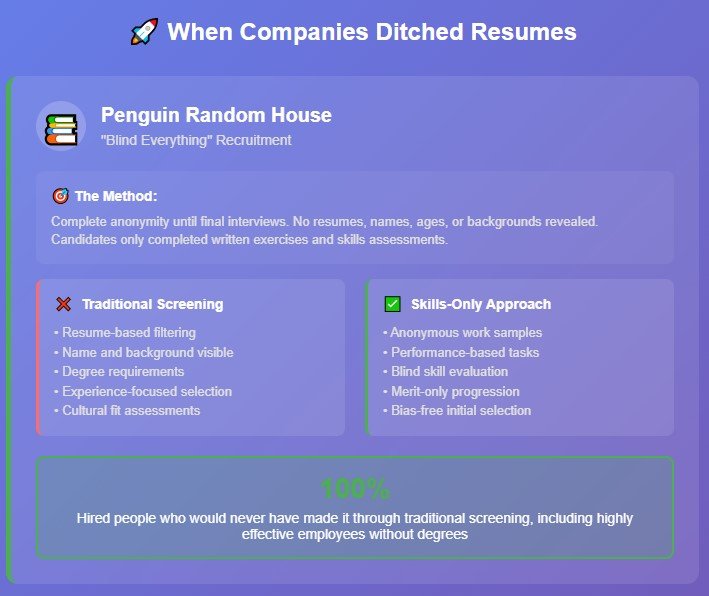
Penguin Random House tried something radical: they recruited people without looking at resumes, names, ages, or backgrounds at all.
Candidates only completed written exercises. No personal information until final interviews.
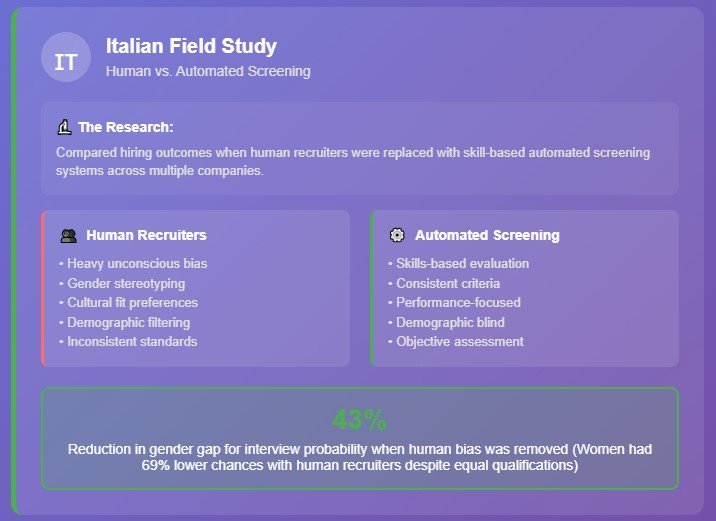
The results? They hired people who never would have made it through traditional screening. Including highly effective employees who lacked degrees.
A field study in Italy found similar results. When human recruiters were replaced with automated screening based purely on skills, the gender gap in interview probability shrank by 43 percentage points.

Human recruiters had been giving women 69% lower chances despite equal qualifications.
What HR Professionals Admit Behind Closed Doors

I love it when researchers ask hiring professionals to be honest about their practices.
86% of US employers and 89% of UK employers report having problems with resumes. A quarter say they receive too many to read. 39% find it difficult to rank candidates.
A third struggle is to determine skills from resumes. 36% can’t assess accuracy.
One recruiter told researchers, “When you apply to a job, you get one chance in the form of an email to represent yourself. You might be one email out of hundreds, or for large organizations, one out of thousands.”
Another admitted: “The majority of hiring professionals spend less than a minute screening each resume and even less time on cover letters.”
The time pressure creates a vicious cycle: No time for thorough evaluation → reliance on superficial indicators → qualified candidates filtered out → need to screen even more resumes.
The Bottom Line: What This Means for You
Look, I’m not sharing all this research to depress you. I’m sharing it because understanding the real system helps you navigate it better.
The good news? Most rejections aren’t personal judgments about your worth. They’re the result of a broken system dealing with impossible volume.
The better news? Now you know exactly what to fix:
- Proofread like your career depends on it (because it does)
- Keep your resume between 475-600 words
- Customize for each application (yes, it’s tedious, but 73% rejection rates are worse)
- Use a professional email address (seriously, ditch the old AOL account)
- Focus on quantified achievements over buzzwords
The best news? Some companies are already abandoning this broken system. Skills-based hiring is growing. Resume-free recruiting is spreading.
The old way of doing things is dying. It’s just taking a while.
Until then, play the game smartly. Fix the obvious mistakes. Understand the psychology. And remember—getting rejected doesn’t mean you’re not qualified.
It often means the system is failing, not you.
What’s the weirdest resume rejection reason you’ve ever heard? Drop a comment below—I’m collecting stories for my next deep dive into hiring horror stories.






